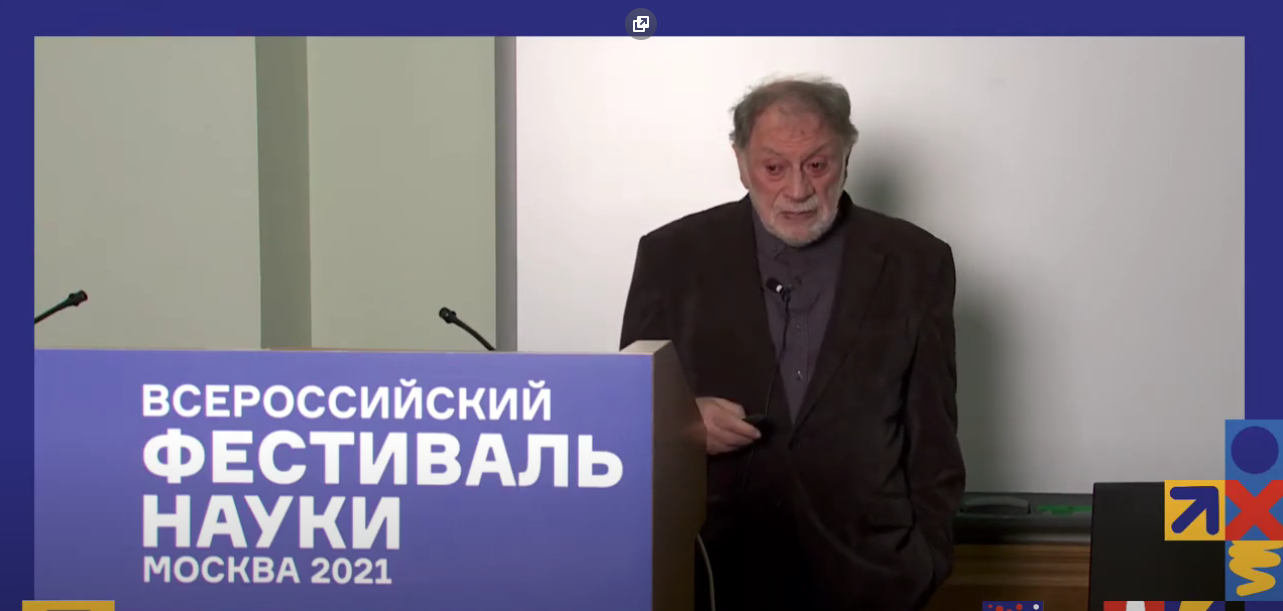
On October 8-10, the NAUKA 0+ festival was held, at which the IEE RAS staff held lectures in schools and in the Shuvalov building of Moscow State University, as well as a round table on the study of sleep. For those who were unable to attend the events, recordings of speeches are available. Photos can be viewed from the link.
Round table on the study of sleep from the leading somnologists of Russia

Leading somnologists discussed the process of a night’s sleep, the formation of dreams, the way the structure of sleep changes with age, how sleep is organized in different animals, how the brain mechanisms of wakefulness and sleep are arranged, as well as discuss the biological clock of the body.
The round table was attended by:
- Mikhail Guryevich Poluektov, Associate Professor, Moscow Medical University. IM Sechenov, Head of the Sleep Medicine Department. Vice President of the National Society of Somnology and Sleep Medicine and the National Society of Children's Sleep Specialists
- Alexander Leonidovich Kalinkin, Head of the Sleep Medicine Center, Medical Research and Education Center, Moscow State University. M.V. Lomonosov. The first Russian Expert of the European Society of Sleep Research (ESRS).
- Vladimir Borisovich Dorokhov, somnologist, doctor of biological sciences, head of the Laboratory of Sleep and Wakefulness Neurobiology, Institute of Higher Nervous Activity and Neurophysiology, Russian Academy of Sciences.
- Vladimir Matveevich Kovalzon, Doctor of Biological Sciences, neurophysiologist, specialist in the experimental study of sleep, chief researcher at the Institute of Ecology and Evolution. AN Severtsov Russian Academy of Sciences, chairman of the section of somnologists of the physiological society. I.P. Pavlova.
The round table is dedicated to the memory of the recently departed Lev Mukhametov and Ivan Pigarev.
Video recording of the lecture is available here.
Lecture "Pressure cooker of evolution: animals in the metropolis" by Natalia Feoktistova

If Charles Darwin found himself on the streets of a modern metropolis, he would be shocked by the speed at which animals and plants adapt to their new urban conditions. It is not for nothing that cities are sometimes called the "pressure cookers of evolution." What unusual biocenoses can be found in the metropolis? What problems do animals and plants face in the city and how are they solved? Who is better off in the city than in the wild? The lecture will answer these and many other questions.
Video recording of the lecture is available here.
Lecture "Microcosm under an electron beam" by Neretina Anna Nikolaevna

A few years ago the microworld, the world of extremely small objects, indistinguishable to the human eye, was of little interest to the public.
However, during the COVID-19 pandemic caused by the rapid and uncontrolled spread of the SARS-CoV-2 coronavirus, we all began to follow the research of the microcosm with interest and excitement. What creatures are inhabited by the microcosm? What do they look like? How are they born, live and die?
Microscopes of various designs allow scientists to study the secrets of the microworld. This lecture will focus on the use of scanning electron microscopes to study a variety of living organisms. The beauty of the microcosm opens up to the observer under an electron beam.
Video recording of the lecture is available here.
Lecture "Scientific expeditions to the Arctic: how scientists study rare species of animals" Artemyeva Svetlana Mikhailovna
Why study polar bears and walrus? What are bioindicator species? How and where are these animals observed? Why do scientists need satellites, as well as the ability to fly a drone? What are the current approaches to the study of marine mammals, what is the progress of current Arctic expeditions? This and more about the expeditions to the Arctic organized by the Arctic Scientific Center "Rosneft" and IEE RAS.
Video recording of the lecture is available here.
Lecture "Noah, Linnaeus and hamsters" by Rurikov Georgy Borisovich
"There are as many species as there were different forms originally created" - wrote Karl Linnaeus, who is called the founder of modern systematics of the living. This aphoristic formula is a summary of the essence of creationism: there is no evolution because species are immutable. But if “there are so many kinds ...”, then they can be counted, which Noah had to have done to select “those who wanted” to get into the ark.
Video recording of the lecture is available here.
Lecture "On a light plane following wild geese: from the Onega Peninsula to Alaska" Rosenfeld Sofia Borisovna
The lecture is devoted to the results of studying anseriformes and other animals using an ultralight aircraft. The results of ten seasons of expeditions will be presented, during which more than 100 thousand kilometers were covered in the Arctic and on the way to it, many beautiful and interesting places that for a long time remained inaccessible to zoologists. The unique capabilities of ultralight aviation and remote telemetry for studying and preserving migratory birds and nature will be demonstrated.
Video recording of the lecture is available here.
